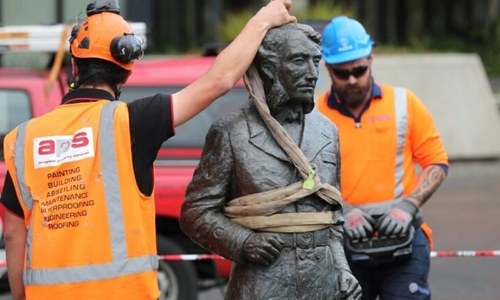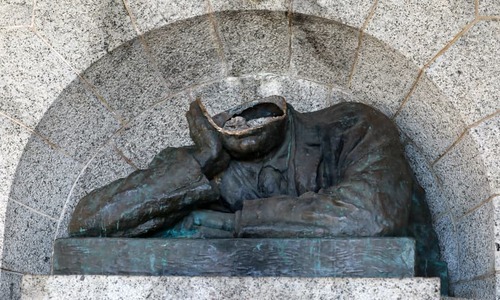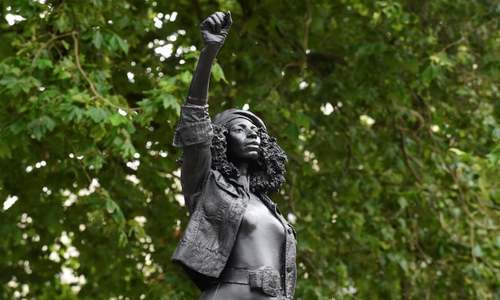WHAT, I thought, would be our reaction — those of us living along the heretofore unimaginatively named Avenue 2 (Lahore) — if some overenthusiastic brigadier, inspired by our vaunted Prime Minister, were, in the spirit of bravado, to rename it Osama Bin Laden Shaheed Road?
It’s bad enough living in Defence Housing Authority, but by now our senses have been numbed to that offence. We are able to call friends and tell them to come to our Defence, but to have to direct them to continue straight on Osama Bin Laden Shaheed Road would be a bit much to stomach.
My thoughts on this are informed by the heated debate that erupted in 2015 when Aurangzeb Road in Delhi was renamed Dr A.P.J. Abdul Kalam Road. This is what I wrote then about how one might go about such a renaming:
“It doesn’t seem right that some minister or bureaucrat or parliamentarian or sena somewhere can mandate such an uprooting of traditions. A street really belongs to the people who live and work in it, for whom it is a part of past memories and present lives. If they wish to rename Aurangzeb Road as Dr A.P.J. Abdul Kalam Road they at least have some legitimate claim to do so and they should be able to exercise that right in an acceptable manner. My own guess is that the denizens of Aurangzeb Road would not have given the name a second thought but in case they wished to rename it, they would have been very unlikely to have opted for what has, once again, been foisted on them without their participation.”
People have a right to honour what they wish to honour. There is no call to fear that democratic choice.
I don’t feel any differently now. People have a right to honour what they wish to honour. There is no call to fear that democratic choice. What is needed is a process to determine the choice. Many people have voiced disapproval of the ongoing movement to remove monuments associated with slavery and colonialism because these are deemed part of history and it is felt people ought to be able to live with history.
Forget Churchill or Rhodes in this context and imagine something much closer to home. Imagine during the ‘Decade of Development’ some lackey installing a statue of Field Marshal Ayub Khan in Barisal presenting it as a token of gratitude of the citizens for all the wonderful things the field marshal had done for them.
And then East Pakistan becomes Bangladesh in 1971 and in 2007 the field marshal’s diaries are published with entries like the following:
“They [Bengalis] have no culture and language of their own nor have they been able to assimilate the culture of the Muslims of the subcontinent by turning their back on Urdu.”
“Without meaning any unkindness, the fact of the matter is that a large majority of the Muslims in East Pakistan have an animist base which is a thick layer of Hinduism and top crust of Islam which is pierced by Hinduism from time to time.”
Would the people of Barisal be entitled to ask what the statue of the field marshal is doing in the middle of the city, what it symbolises, and why it is still there?
What makes those against toppling statues recoil and adopt a conservative stance is the violence accompanying the movement. It is felt that matters ought not be resolved in anger and it is wrong for small numbers to exercise outsized influence by taking matters into their own hands. Such critics advise protesters to use constitutional means to achieve their ends.
For such critics, one can do no better than to quote from the letter Martin Luther King, the icon of non-violent protest in the US, wrote from Birmingham Jail in 1963:
“I have almost reached the regrettable conclusion that the Negro’s great stumbling block in the stride toward freedom is not the White Citizen’s Counciler or the Ku Klux Klanner, but the white moderate who is more devoted to ‘order’ than to justice; who prefers a negative peace which is the absence of tension to a positive peace which is the presence of justice; who constantly says: ‘I agree with you in the goal you seek, but I can’t agree with your methods of direct action.’”
In recommending constitutional means to protesters what is ignored is the fact that constitutional means are not open to them. Take the most recent events in the US where President Trump has blocked almost every avenue for reasoned debate on the subject.
What one should recommend is that the choice of removing statues, much like that of renaming streets, ought to be part of the democratic process. Citizens should be able to call for a referendum on either without being subjected to threats or coercion.
In giving advice to respect history one ought not to forget that statues were erected and streets and places named without the participation of those involved. More often than not, it was the imposition of the will of an exploitative minority on an oppressed majority to symbolise the reality of an asymmetrical relationship of power. Still, people are reasonable and do not demand a reversal of all history. They are fine with Lawrence Road but a statue of Clive in Kolkata is another matter and rightly so. I doubt if people are consulted they would ask for the sphinx to be demolished because it was built with conscripted labour.
The wrongs of an ugly past need to be righted. As for the future, installations and names should be based on the preferences of those who live and work in the proximity. And statues can be removed and roads renamed using a similar consultative process.
I am making this case rather strongly because I want to pre-empt Avenue 2 from being renamed Osama Bin Laden Shaheed Road. The name does need to be changed but the choice of the replacement is best left to those living along it if they so desire.
The writer is the author of Transgressions: Poems Inspired by Faiz Ahmed Faiz.
Published in Dawn, July 17th, 2020














































